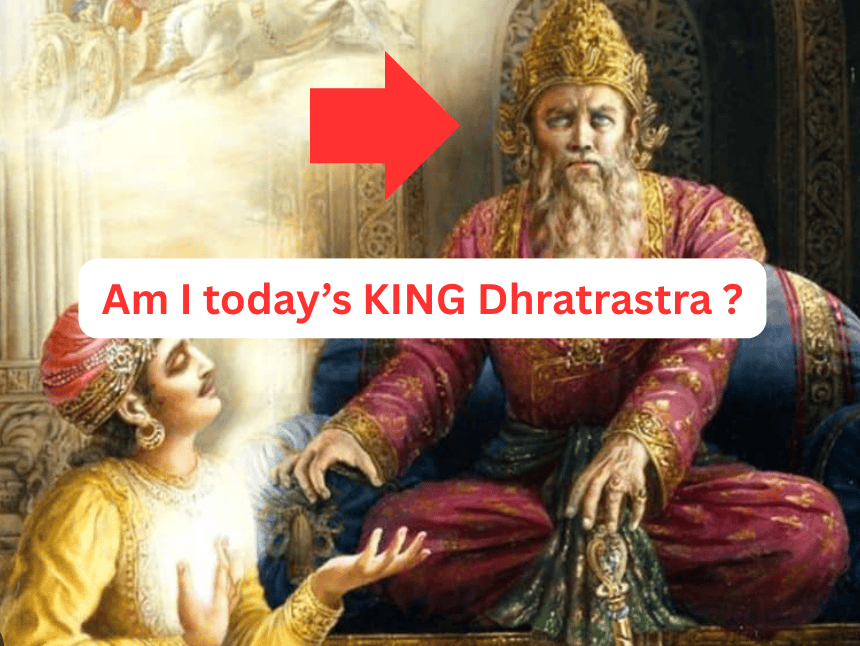धृतराष्ट्र उवाच
धर्मक्षेत्रे कुरुक्षेत्रे समवेता युयुत्सवः ।
मामकाः पाण्डवाश्चैव किमकुर्वत सञ्जय ।।१।।
धृतराष्ट्र बोले- हे सञ्जय ! धर्मभूमि कुरुक्षेत्र में
एकत्रित, युद्ध की इच्छा वाले मेरे और पाण्डु के पुत्रों
ने क्या किया ? ।। १ ।।
Dhratrastra said: Sañjaya, gathered on
the sacred soil of Kuruksetra, eager to fight,
what did my children and the children of
Pandu do?

What was the King Dhratrastra going through ?
My voice trembles as I ask this, for deep within, I know the answer will bring news of great destruction.
My heart is heavy with guilt—I, who failed to restrain my sons,
who ignored the wisdom of Vidura and Lord Krishna, now face the consequences of my own blindness, both literal and moral.
Modern-Day Connection:
Dhritarashtra’s question reflects a timeless human dilemma—willful ignorance and the consequences of unchecked ambition. Today, many leaders, corporations, and even individuals ignore ethical warnings (like environmental destruction, corruption, or social injustice) for short-term gains, only to face irreversible consequences later.
-
Political Conflicts: Like the Kauravas’ greed, modern wars and power struggles arise from ego, entitlement, and refusal to compromise.
-
Environmental Crisis: Just as Dhritarashtra ignored Vidura’s wisdom, humanity often ignores scientists’ warnings about climate change until disaster strikes.
-
Personal Accountability: Dhritarashtra’s blindness symbolizes how people today refuse to “see” their role in problems, blaming others instead.
The Mahabharata’s message remains relevant: when dharma (righteousness) is ignored, destruction follows. The choice between greed and wisdom, justice and corruption, is eternal.
Dhritarashtra Dilemma: A Timeless Human Struggle
1. Dhritarashtra’s Situation in the Mahabharata
Dhritarashtra, the blind king of Hastinapur, was trapped in a web of attachment, fear, and moral weakness. Despite knowing right from wrong, he:
-
Ignored Dharma (Righteousness): He allowed his sons, the Kauravas, to cheat, humiliate, and attempt to kill the Pandavas, all because of his blind love for Duryodhana.
-
Feared Loss of Power: He knew war would bring destruction, but his attachment to his throne and his sons clouded his judgment.
-
Avoided Responsibility: Instead of stopping the conflict, he kept asking Sanjaya for updates, hoping for a favorable outcome without taking action.
-
Lived in Denial: Even when Krishna offered peace, Dhritarashtra hesitated, secretly wishing for his sons’ victory despite knowing their adharma (unrighteousness).
His inner conflict was between duty (raj-dharma) and personal attachment (moha)—a battle he lost, leading to the destruction of his entire dynasty.
2. Modern-Day Dhritarashtras: When We Face the Same Dilemma
Every person, at some point, becomes a “Dhritarashtra”—torn between right and wrong, action and inaction, truth and convenience. Here’s how:
A. In Personal Life
-
A Parent Spoiling a Child: Like Dhritarashtra favoring Duryodhana, some parents ignore their child’s arrogance or wrongdoing, leading to bigger problems later.
-
Staying in Toxic Relationships: Knowing a relationship is harmful but clinging to it out of fear of loneliness or attachment.
-
Ignoring Health Warnings: Like Dhritarashtra ignoring Vidura’s advice, people today ignore doctors’ warnings (about diet, stress, addictions) until it’s too late.
B. In Professional Life
-
Unethical Work Practices: A manager turning a blind eye to corruption or exploitation in their company for personal gain, just as Dhritarashtra ignored the Pandavas’ suffering.
-
Fear of Speaking Up: Employees staying silent about workplace harassment or fraud, fearing repercussions—just like Dhritarashtra’s courtiers who didn’t oppose the Kauravas.
C. In Society & Leadership
-
Politicians Choosing Power Over Justice: Leaders who ignore public welfare, favoring cronyism and short-term gains—just like Dhritarashtra’s weak kingship.
-
Environmental Neglect: Governments and corporations ignoring climate change warnings for profit, leading to long-term disaster—similar to how Dhritarashtra’s inaction led to war.
The Lesson: Breaking Free from the “Dhritarashtra Mindset”
Dhritarashtra’s tragedy was not his blindness, but his refusal to see the truth. In modern times, we face similar moral crossroads:
-
Do we stay silent when we should speak?
-
Do we choose comfort over courage?
-
Do we ignore long-term consequences for short-term gains?
The Mahabharata teaches us that indecision, favoritism, and moral weakness lead to ruin—whether in ancient kingdoms or today’s world. The only way out is to face the truth, act with integrity, and choose Dharma over desire.
“Every time we ignore our conscience, we become a little like Dhritarashtra. And every time we choose justice over convenience, we become a little more like Vidura.”
DoFollow Link (WhatsApp Channel for Updates):